Matthias Orlikowski
Bielefeld University
Balancing Quality and Variation: Spam Filtering Distorts Data Label Distributions
Sep 10, 2025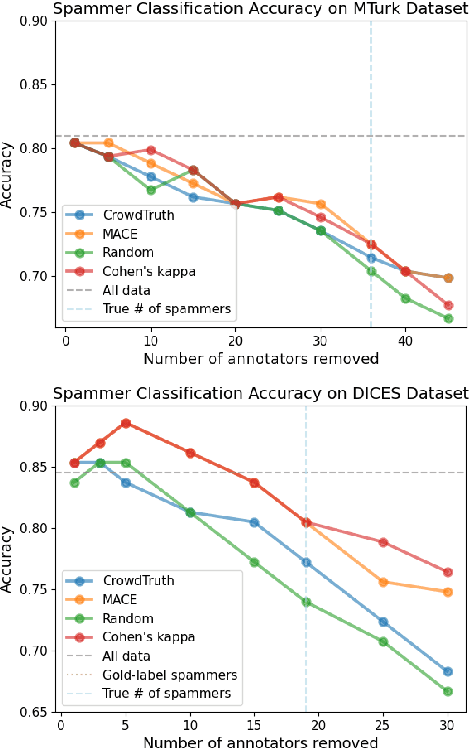

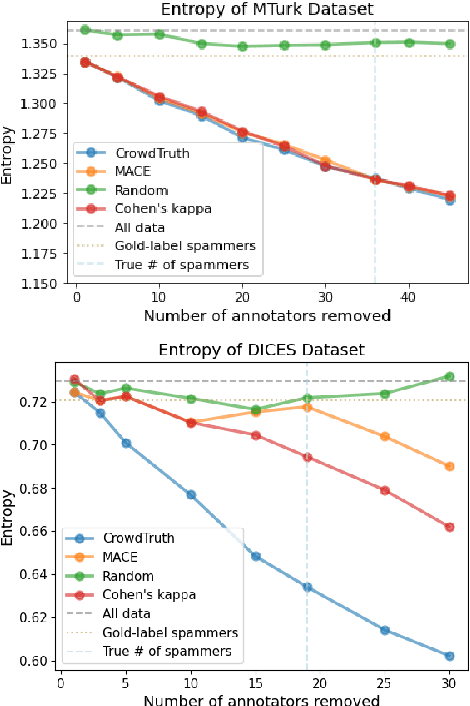
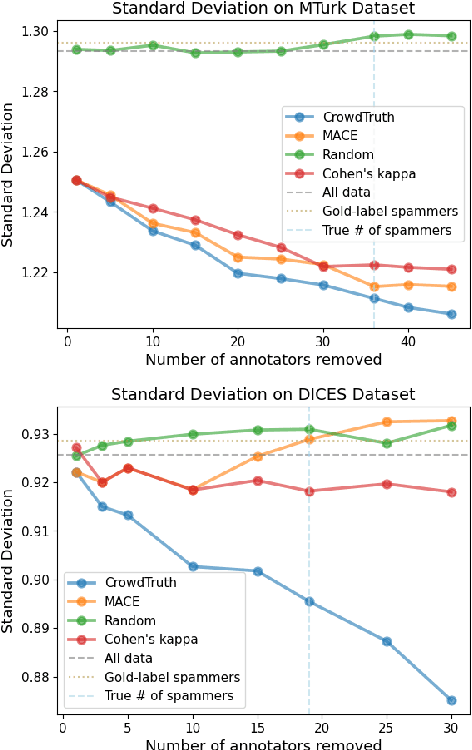
Abstract:For machine learning datasets to accurately represent diverse opinions in a population, they must preserve variation in data labels while filtering out spam or low-quality responses. How can we balance annotator reliability and representation? We empirically evaluate how a range of heuristics for annotator filtering affect the preservation of variation on subjective tasks. We find that these methods, designed for contexts in which variation from a single ground-truth label is considered noise, often remove annotators who disagree instead of spam annotators, introducing suboptimal tradeoffs between accuracy and label diversity. We find that conservative settings for annotator removal (<5%) are best, after which all tested methods increase the mean absolute error from the true average label. We analyze performance on synthetic spam to observe that these methods often assume spam annotators are less random than real spammers tend to be: most spammers are distributionally indistinguishable from real annotators, and the minority that are distinguishable tend to give fixed answers, not random ones. Thus, tasks requiring the preservation of variation reverse the intuition of existing spam filtering methods: spammers tend to be less random than non-spammers, so metrics that assume variation is spam fare worse. These results highlight the need for spam removal methods that account for label diversity.
Beyond Demographics: Fine-tuning Large Language Models to Predict Individuals' Subjective Text Perceptions
Feb 28, 2025Abstract:People naturally vary in their annotations for subjective questions and some of this variation is thought to be due to the person's sociodemographic characteristics. LLMs have also been used to label data, but recent work has shown that models perform poorly when prompted with sociodemographic attributes, suggesting limited inherent sociodemographic knowledge. Here, we ask whether LLMs can be trained to be accurate sociodemographic models of annotator variation. Using a curated dataset of five tasks with standardized sociodemographics, we show that models do improve in sociodemographic prompting when trained but that this performance gain is largely due to models learning annotator-specific behaviour rather than sociodemographic patterns. Across all tasks, our results suggest that models learn little meaningful connection between sociodemographics and annotation, raising doubts about the current use of LLMs for simulating sociodemographic variation and behaviour.
Architectural Sweet Spots for Modeling Human Label Variation by the Example of Argument Quality: It's Best to Relate Perspectives!
Nov 06, 2023Abstract:Many annotation tasks in natural language processing are highly subjective in that there can be different valid and justified perspectives on what is a proper label for a given example. This also applies to the judgment of argument quality, where the assignment of a single ground truth is often questionable. At the same time, there are generally accepted concepts behind argumentation that form a common ground. To best represent the interplay of individual and shared perspectives, we consider a continuum of approaches ranging from models that fully aggregate perspectives into a majority label to "share nothing"-architectures in which each annotator is considered in isolation from all other annotators. In between these extremes, inspired by models used in the field of recommender systems, we investigate the extent to which architectures that include layers to model the relations between different annotators are beneficial for predicting single-annotator labels. By means of two tasks of argument quality classification (argument concreteness and validity/novelty of conclusions), we show that recommender architectures increase the averaged annotator-individual F$_1$-scores up to $43\%$ over a majority label model. Our findings indicate that approaches to subjectivity can benefit from relating individual perspectives.
The Ecological Fallacy in Annotation: Modelling Human Label Variation goes beyond Sociodemographics
Jun 20, 2023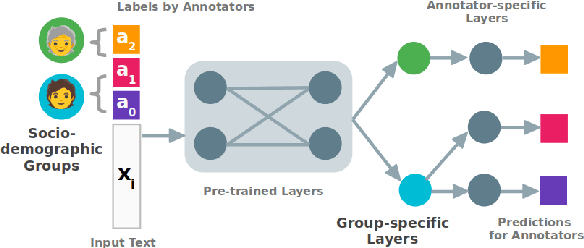
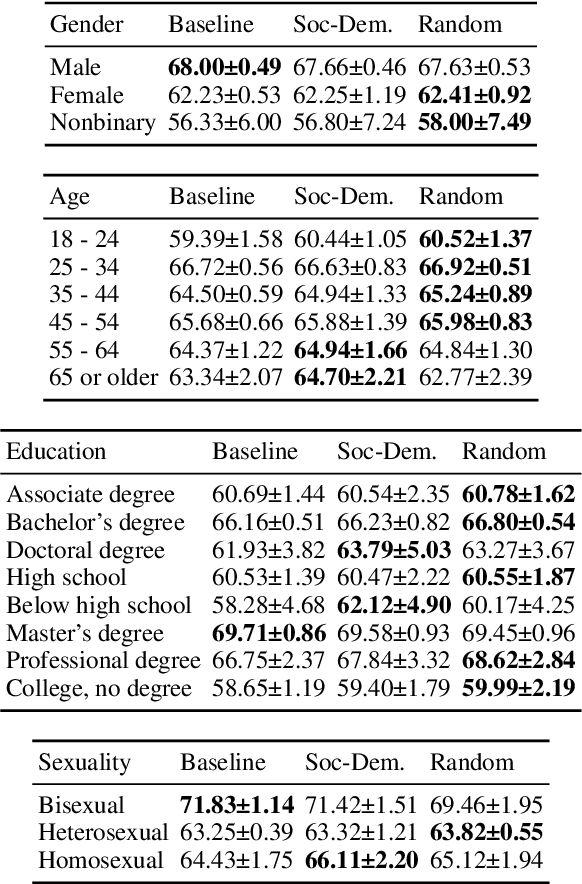
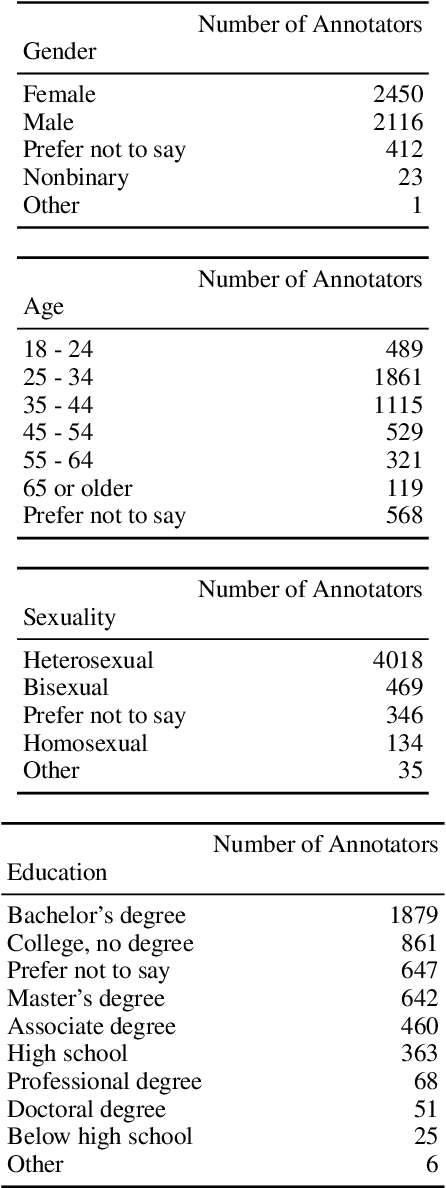
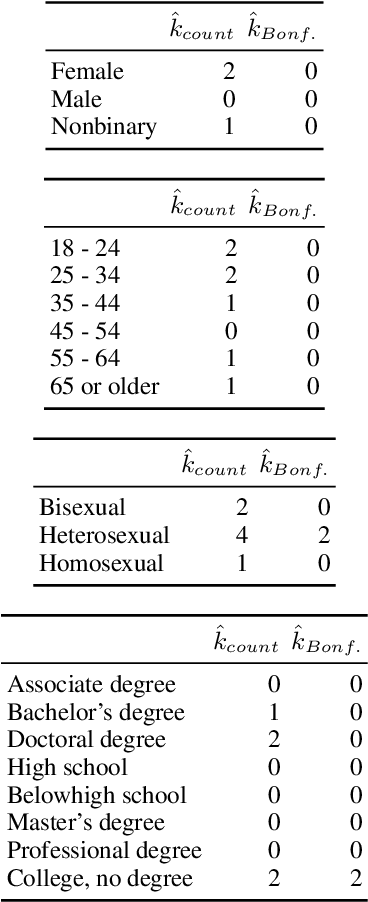
Abstract:Many NLP tasks exhibit human label variation, where different annotators give different labels to the same texts. This variation is known to depend, at least in part, on the sociodemographics of annotators. Recent research aims to model individual annotator behaviour rather than predicting aggregated labels, and we would expect that sociodemographic information is useful for these models. On the other hand, the ecological fallacy states that aggregate group behaviour, such as the behaviour of the average female annotator, does not necessarily explain individual behaviour. To account for sociodemographics in models of individual annotator behaviour, we introduce group-specific layers to multi-annotator models. In a series of experiments for toxic content detection, we find that explicitly accounting for sociodemographic attributes in this way does not significantly improve model performance. This result shows that individual annotation behaviour depends on much more than just sociodemographics.
 Add to Chrome
Add to Chrome Add to Firefox
Add to Firefox Add to Edge
Add to Edge